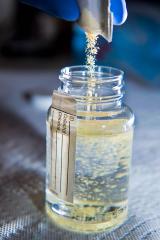
Test private wells to ensure safe drinking water
- Posted by Barrington Hills
- On February 16, 2022
UPDATE:
Lake County Health Department is offering a reduced well-water testing fee of only $14 for homeowners in observance of National Groundwater Awareness Week, beginning March 7th and ending March 17th.
A limited number of well-water test kits are available at Village Hall from 9 AM – 5 PM on a first-come, first-served basis.
For testing details, contact Lake County’s Health Department directly at 847-377-8000 or via their website: LakeCountyIL.gov.
WHY SHOULD YOU TEST?
Read below the Village’s post from February 11th!
February 11, 2022
BACOG is planning to host a Level I private well testing at a reduced cost in May. Check back often as details will be posted when available.
Don’t want to wait? Stop by Village Hall (9 AM – 5 PM) to pick up a well-water test kit to be brought to Lake County Environmental Laboratory. Additional information included in the kit.
Why should you test? Daily Herald published a great article to provide these answers. See below.
For those interested in Level II testing, visit the Illinois State Water Survey Laboratory website. Due to pricing changes, BACOG is not currently facilitating Level II testing.
What are the differences? Follow these links for details: BACOG’s Water Information or Illinois State Water Survey General Information.
DAILY HERALD FEBRUARY 10, 2022
By Doug Gucker
Illinois Extension Local Food Systems
Small Farms Educator
A properly constructed and maintained water well can provide many years of
trouble-free service, but over time, wells can deteriorate or become damaged,
allowing surface contaminants to enter the water in the well. In addition,
groundwater can become contaminated.
Safe drinking water is crucial. Public water systems must monitor water’s safety
at least monthly. For private well owners, testing falls on the homeowner.
University of Illinois Extension’s Doug Gucker recommends annual inspections
and testing.
“Spring is the best time to test your well’s water,” Gucker said.
Illinois receives its largest amounts of rainfall from April through June. During
periods of higher rainfall, surface water may pick up contaminants, such as
bacteria, nitrates, or pesticides.
“If the upper part of your well has any cracks or leaks, this contaminated water
could find its way into your well,” Gucker said. “Additionally, you should test the
well’s water after the well has been opened, underwater, or in a fire.”
Annual testing for bacteria and nitrates is recommended. Coliform bacteria
levels are tested to monitor bacterial safety.
“These bacteria do not usually cause disease or illness, but its presence indicates
surface contamination has found its way into your well, alerting you to the
possibility other disease-causing organisms may be present,” Gucker said.
High nitrate levels in drinking water are a concern for children less than six
months old. Nitrogen, in the form of nitrates, is a common contaminant in
Illinois groundwater and likely caused by a malfunctioning septic system, animal
manure, or runoff from farm fields.
Coliform bacteria and nitrate testing can be done by most local Illinois public
health departments. To find your local county health department, visit the
Illinois Department of Public Health directory.
“Consult your local health department to see if you should be testing for other
contaminants, such as volatile organic compounds (fuels and oils) or heavy
metals,” Gucker said. “Certified labs can also test well water and may be your
only option for certain chemicals.”
Careful water sampling is required to get accurate results from the water testing
kit that you received from the local county health department or a certified lab.
Read and follow all the instructions included in the testing kit, Gucker advises.
More information on private well water testing can be found on the Illinois
Environmental Protection Agency Well Water Testing website or by contacting your local health department, or the Illinois Department of Public Health at (217) 782-5830.
The Illinois Extension leads public outreach for University of Illinois by translating research into action plans that allow Illinois families, businesses, and community leaders to solve problems, make informed decisions, and adapt to changes and opportunities.


